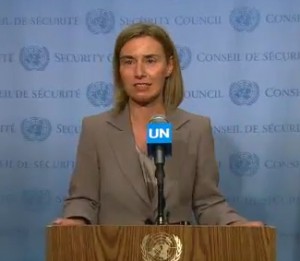By Sami Zaptia.

London, 8 June 2016:
Yesterday, the EU revealed its latest policy on dealing with illegal migration, including those transiting through . . .[restrict]Libya and crossing the Mediterranean Sea. The new policy announcement is called the ‘’Partnership Framework with Third Countries under the European Agenda on Migration’’.
The policy includes a ‘’compact’’ of carrots and sticks to migrants’ countries of origin, including Sudan and Eretria, whereby aid and investment is conditional on policy measures by those states that would.
At a press conference in Brussels yesterday, High Representative of the European Union for Foreign Affairs, Federica Mogherini, was asked if cooperation between the EU and Libya on migration would involve sending migrants back to the North African country.
Mogherini refuted the presumption that migrants departing from Libya would be returned there. She said that cooperation with Libya would be on stabilising the country, addressing the humanitarian situation of Libyans, establishing state institutions and security structures enabling the Libyan to management of migration flows.
‘‘You might have noticed that we have no migrants from Libya – we have migrants coming through Libya’’, she said
‘‘So what we are planning is nothing in the lines that you mentioned, but a cooperation with the Libyan authorities first and foremost – let me stress this – to support their work to stabilise the situation in the country, to address the humanitarian situation of Libyans, which is the precondition for anything else, and to establish State institutions and structures and security structures that would enable the government to have a full control of the territory and of the country, including its economic resources, including its borders, which lead us to the management of migration flows’’.
‘‘What we are working on with the Libyan authorities – with Prime Minister Al-Sarraj in particular, I discussed this with him a couple of days ago – is to work on three different levels’’.
‘‘First, at sea. As you know, we are working on extending the mandate of Operation Sophia to include the training of the Libyan coastguards and navy; so that they (Libyans) can themselves control their territorial waters, and also this has a security aspect, but also a migration aspect’’.
‘‘Second, build the institutions that are dedicated to the control of the borders and the migratory flows within the country. This will take time, but the institution-building support is something where the European Union has a specific added value; and we are working with the Libyan authorities in that direction’’.
‘‘Third, work is ongoing since quite some months now to work on the South of Libya, meaning the Libyan territorial borders to the Sahel which is the entry point to Libya’’.
‘‘We know very well that around 75/80 percent of the migratory flows to Libya go through Agadez, in the north of Niger – that was my first African visit on the ground, discussing with the local authorities and with the State authorities ways in which we can create alternatives to the criminal economy of the smugglers and also to increase the control of the territory and of the border by the authorities of Niger’’.
‘‘And we are going to have next week in Brussels, on 17 June, the third meeting with the ministers of the Sahel G5, including Niger, where the issue of working on the migratory routes into Libya – from the Sahel – will be one of the main issues we will discuss, including also some of the elements that we discussed today like the support to job creation, and also control of the territory of some of the key countries, and especially in this case Niger, but also Chad, Mali and others’’.
With regards to strengthening Libyan state institutions and border controls, it was not clear what EU cooperation with regards to militias will be.
It was not clear if the EU was planning to work with existing militias intact in their present formations, as is the case in Tripoli and the installation of the Faiez Serraj and his Presidential Council/Government of National Accord. [/restrict]







